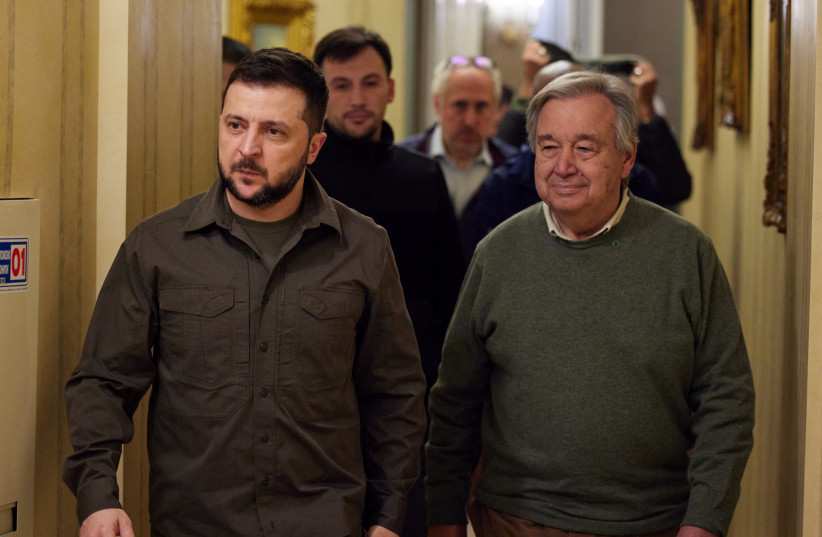The systemic nature and widespread acts of forced transfers of civilians, mass rapes, mass killings and detentions of Ukrainians indicate a Russian military strategy to achieve genocide, the Ukrainian human rights NGO ZMINA argued to The Jerusalem Post.
<br>A strategy of "genocide"
"We argue that this is genocide," ZMINA project coordinator Nadia Dobrianska said of alleged Russian war crimes during the ongoing Russian invasion of Ukraine.
She acknowledged it was as a big statement that required a lot of proof, “But that's how we see it, because what is going on is mass extermination of Ukrainians on a systemic scale by Russians."
Dobrianska explained that the mass killing and destruction of civilian objects on the large scale that has been witnessed and alleged in Ukraine is not justifiable by achieving military objectives. The war crimes were being committed far too consistently to be soldiers acting out of line or seizing the opportunity.

"They're doing this because this is their strategy, targeting civilians, executing men and committing mass rape, as in a way to break the civilian population," said Dobrianska.
ZMINA's project coordinator pointed to the rhetoric of Russian officials leading up to the invasion — Denial of Ukraine's right to exist as a nation, and talk of “denazification” — As an indication of intent.
<br>#TheTaken
One of Russia's alleged crimes is the mass abductions of civilians and local political leaders in occupied Ukrainian territory. ZMINA has launched a campaign, #TheTaken, to bring attention to the abductions.
"What we're seeing is that they have lists of wanted people," Dobrianska explained. "We're hearing reports about them using these lists on the checkpoints, for example, where people are their identities verified, and then if there seem to be in the list they're taken."
ZMINA's understanding is that they are coercing local municipal authorities to cooperate with Russia.
ZMINA publishes and brings awareness to the arrest of these people, and they've seen that it increases the chance of their release. However, "people who are not released within the first few days, it's very hard to have them released," said Dobrianska.
"Our aim with this campaign is to keep talking about them, is to keep telling their stories so they're not forgotten because the numbers are soaring," she continued.
Forced transfers
In addition to the arrest of Ukrainian civilians, there have also been many reports of mass deportations of Ukrainians into Russia.
"It's very hard even for us, given our connections with human rights workers in Russia, to get any clear, verifiable information that we are hearing about Ukrainians who are being deported," said Dobrianska. "The scale of mass deportations remains to be seen probably in the coming days."
Dobrianska said that there were reports that Ukrainian children had been transferred to Russia for adoption.
"It's the definition of genocide," she said. "I can't even come up with any explanation or way to soften this message."
Ukrainian Foreign Ministry spokesperson Oleg Nikolenko said in late March that Russian forces had relocated 2,389 children from the Donbas region into Russia.
Ukraine's ombudswoman for human rights Liudmyla Denisova said in mid-April that Russia had taken 134,000 people from Mariupol, and of those 33,000 of those were forcibly deported, Reuters reported but was unable to confirm.
Russian officials have denied there have been forcible transfers, which are against the Geneva Conventions, saying that residents immigrated voluntarily.
<br>Massacres and justice
The world was shocked in early April when it was revealed that hundreds of civilians had been killed in Bucha, Ukraine, and buried in shallow graves.
Russia is alleged to have engaged in mass executions.
As Ukrainians return to territory previously under occupation, Dobrianska expects “the world will hear even more once journalists get access to all sites of murder because at the moment Russians have left lots of landmines and booby traps.”
Russian forces are alleged by the Ukrainian military to have engaged in the rapes of hundreds of Ukrainian women — ZMINA sees this too as part of Russia’s strategy.
“It's a strategy of intimidating and crushing Ukrainians as a nation and breaking Ukrainian women's dignity and their sense of self-respect,” said Dobrianska.
Ukrainian soldiers have also been alleged to have engaged in war crimes — In early April The New York Times verified a video in which Ukrainian soldiers executed Russian servicemen.
“Whenever there are abuses of international humanitarian law by Ukrainian forces this definitely has to be investigated and they should be brought to justice,” said Dobrianska. “I hope that the Ukrainian Army is doing their best to avoid any of this happening. But if it does, this is their utmost responsibility to bring the soldiers to justice too, because we cannot afford not to, while also calling out Russian atrocities.”
Dobrianska says that it will be a difficult and long road to bring Russia’s alleged war crimes to justice but remained optimistic.
However, she “can't see [Russian President Vladimir] Putin being brought before the International Criminal Court unless there is a comprehensive victory by Ukraine.”
